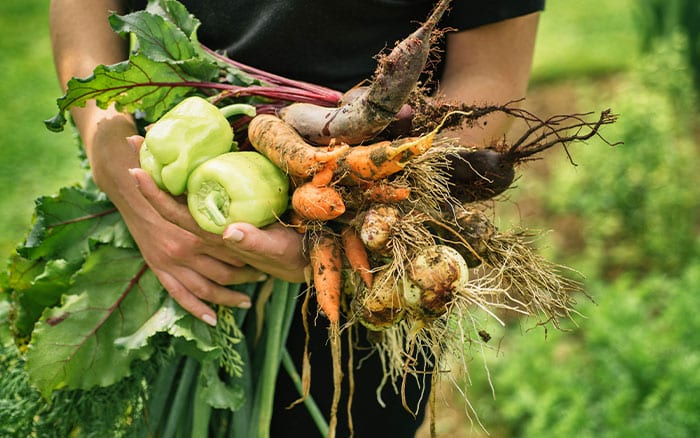Going organic when growing your own requires a high level of organization and persistence. You need to keep soil fed with compost and manures, rotate crops year after year, keep a beady eye on weeds, and much more. But is all this effort worth ditching the pesticides?
What is organic gardening?
Organic gardening is a method that makes minimal use of artificial chemical substances. This means avoiding synthetic pest, disease, and weed controls. Also, only fertilising soil with natural substances derived from animal and plant remains. It is the way that all farmers used to do it in the good old days, when delivering a bumper crop relied heavily on a deep understanding of the local ecosystem.
In practice, though, organic gardening is labour-intensive and time-consuming. It requires meticulous organisation, painstaking patrolling and, at times, the building of physical defences against pests. And, even now, its not foolproof. The extra effort may lead you to wonder whether organic growing is right for you.
What are the motivations for organic growing?
An extensive 2014 study by Newcastle University found significant differences between the nutritional content of organic versus conventionally produced foods. Organic crops had up to 60% more antioxidants in them than their conventionally produced counterparts. This seems desirable as antioxidants have been linked to a reduced risk of chronic diseases and certain types of cancer. Yet, it is difficult to know whether this finding applies to homegrown produce as well, since the study only examined industrially-produced crops.
While some will swear that organic produce tastes better than its non-organic alternative, there is little to back this up! It likely comes down to personal preference. Nutritional value and taste, then, may not make this decision for you.
Another motivation comes from worries about pest control measures. You may be tempted to reach for the bug spray to blast them into oblivion. Since pest controls are, by design, toxic to certain forms of life, you might worry that these also pose a hazard to other lifeforms such as us.

What are the potential impacts of pesticides on human health?
If you’re using chemical pesticides when growing your own, then you may be exposed to chemicals both during application and when you eat treated crops. However, the UK Health and Safety Executive strictly regulates chemical pesticides available on the amateur market. This prevents anything with high toxicity to humans and anything that requires protective clothing, from being sold to home gardeners. As a result, non-organic home pesticides are safer than those used in the food industry. And non-organic home produce will have less severe pesticide residues on it than the equivalent shop-bought items.

Nonetheless, there is still a question mark over the long-term effects of regularly ingesting pesticide residues on treated foods. They are certainly not part of our natural diet. Indeed, not knowing what the health effects are leads some gardeners to go organic as a better-safe-than-sorry measure.
It is important to note, however, that pesticides labelled ‘organic’ still need to be treated with care. Plenty of natural substances can be poisonous to humans – deadly nightshade, for example, is 100% natural! Pyrethrins, extracted from Chrysanthemum plants and form the main ingredient in some organic bug sprays, may irritate the skin or cause headaches if inhaled. So, do your research before treating produce. The take-home point is that all control measures need to be used with care, even if organic.
What is the impact of pesticides on wildlife?
Another reason to be careful is that pest controls don’t just affect humans, but can impact other creatures in our environment. Ladybirds, frogs, hedgehogs, ground beetles, butterflies, bees, and birds are all gardeners’ friends. Also, microorganisms break down organic matter, making vital nutrients available to our plants.
If we overdo it with pesticides, this delicate balance can be thrown off-kilter. This can happen when creatures come into direct contact with a pesticide or when they eat pests that have been controlled using them. When using pest controls, it’s wise to be mindful that the choices you make in your garden can have wide-reaching effects.
In recent years, artificial neonicotinoid pesticides were withdrawn from use due to their potential to harm bees. However, organic pyrethrins that are still available to home gardeners can also negatively affect bees and other pollinators, such as ladybirds.

How to protect ourselves and our wildlife
There are some excellent general rules for controlling pests, which will help to limit the effect of your gardening practices on human health and wildlife:
Prevention is better than cure:
Choose pest-resistant plant varieties and keep plants healthy to give them the resources to fight off infections themselves. This helps to limit the need for additional controls.
Match the hammer to the nail:
Use the safest controls first and escalate only if necessary. Companion planting, physical removal, biological controls and barrier methods can all be investigated before opting for a pesticide.
Avoid the worst offenders:
If you wish to use chemical pesticides, avoiding ‘systemic’ or ‘translocated’ products will do some good. These pesticides are absorbed by the plant and work from the inside out, meaning they cannot be washed off produce before we eat it and get into nectar and pollen. This causes potential problems for pollinators.
Apply with care:
If using any pesticide, avoid spraying on open blooms where pollinators land. Limit its spread by avoiding spraying plants on a windy day. And always follow the instructions on the label to protect yourself during application.
Go part-organic:
If you’re worried that completely organic gardening is overly difficult, why not go part way there? Going organic for produce that you eat in its entirety, e.g. courgettes as opposed to carrots, will limit the amount of residue on the skin of homegrown food. This will reduce the impact on visiting wildlife.

Leave A Comment